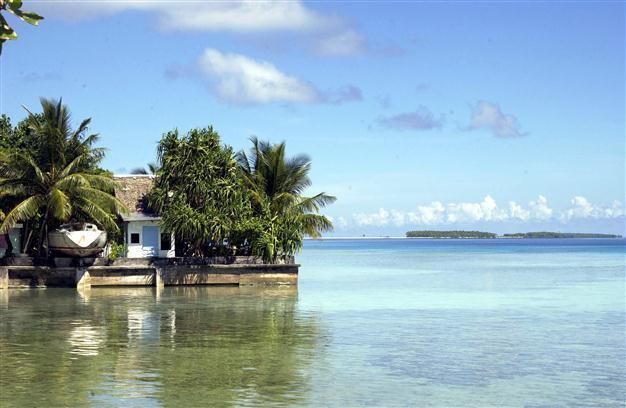Climate talks mean life or death for island states
DURBAN, South Africa - Reuters

A file picture taken on October 31, 2005 shows a concrete wall lining Atafu lagoon to hold back rising sea levels in the New Zealand dependency of Tokelau. AFP Photo
Nature does not negotiate.So while climate change delegates haggle over deadlines, binding targets and finance, some of the world's poorest states are warning that rising sea levels and storms will sweep them away unless the world agrees to tackle global warning.
"We will be one of the first countries to go under water," said Foua Toloa, a senior politician on Tokelau, an island half-way between Hawaii and New Zealand that is no more than five metres above sea-level.
"We are a small and fragile nation very susceptible to environment and climate developments."
Grenada's Foreign Minister Karl Hood, chairman of the 43-nation Alliance of Small Island States (AOSIS), whose members are in the frontline of climate change, was even more blunt:
"If we don't act now, some of us will die."
Many low lying nations can already calculate the cost of rising greenhouse gas emissions in lives lost, economies shattered and landscapes transformed.
"By 2025, rising sea levels could lead to the displacement of at least 10 percent of the population", Comores Vice President Fouad Mohadji told delegates at climate change talks in the South African port city of Durban.
Sea waters could destroy 29 percent of the road network, 30 percent of the hotel infrastructure on which the islands' tourism industry relies, 70 percent of ports and airports, at a cost of $1 billion dollars.
"That is more than twice the country's gross domestic product," he said.
Time for action
Delegates from almost 200 countries have until late on Friday to decide whether to commit to signing up to an internationally binding climate deal by 2015 at the latest.
The European Union is calling for a legally binding global deal to be reached by 2015 and implemented by 2020, but Fiji's Environment Minister Samu Saumutua says that would be too late to reverse rising sea levels that threaten to submerge its islands.
"Cyclones now occur any time of the year, we have fresh floods, in the coastal areas the fresh water supply is now inundated with salt water," he said. "We are desperately looking at how we are going to deal with the situation at home."
It is not only islands that are suffering.
Herman Rosa Chavez, El Salvador's environment minister, said a tropical depression that swept across Central America two months ago flooded 10 percent of his country, causing losses of $840 million -- some four percent of GDP.
"We went from being impacted by one extreme weather event per decade in the 1960s and 1970s, to nine in the last 10 years," he said, illustrating the accelerating pace of climate change.
Several delegates accused the global economic powers of ignoring science and putting in peril the very survival of states which contribute little to the millions of tonnes of carbon spewed into the atmosphere each year, but which are most directly affected by the resulting climate change.
"Some people have a vested interest not to make any progress in these negotiations," said Tosi Mpanu-Mpanu, the head of the Africa group.
Allies needed
He said countries should start by committing to a second period of the Kyoto Protocol, whose clause on enforcing targets on carbon cuts expires at the end of next year, but Grenada's Hood said a legally-binding deal should be agreed now.
"We have all the ingredients to start work right now, and to have the legal force by next year," he said.
The United States has denied trying to derail the process until after 2020, but Hood was not convinced.
"Thank you very much, let me see that in the negotiation room, let me see that in the text," he said in response.
The fragile islands states and many of the other vulnerable countries in Africa, Asia and Central and Latin America do not have the financial firepower to tackle the crisis alone.
"In recent years we have found ourselves spending millions to build defence walls due to coastal degradation and rising sea levels, millions to clean up after floods," said Dominica's Environment Minister Kenneth Darroux.
They hope a Green Climate Fund will emerge from Durban that will channel up to $100 billion a year to help developing countries tackle the adverse effects of global warming.
"We are not begging you, but we need allies," said Luis Ferrate, head of the Guatemalan delegation.
















